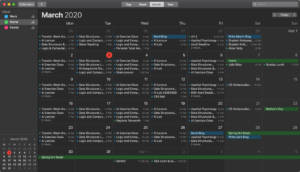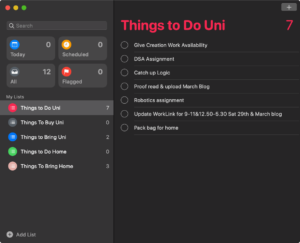University is a time in your life when there’s a lot of…time. There’s also a lot to do, and this all works out quite well indeed, provided you follow a routine, or otherwise organise yourself.
The first step I’d suggest is some form of calendar, whether on paper or digital. This won’t organise your time for you, but it will help you see when you have spare time amongst the deadlines & other commitments which you’ll inevitably end up acquiring over the Semester. I strongly advocate something cloud based, possibly connected to your email account, or your iCloud/Google account. At the bare minimum, have a paper calendar and fill it in with your university timetable – adding the other things as they arise.

A calendar is great for showing when you do/don’t have spare time, but how do you decide what to do with this time? This is where a to-do list comes in – I recommend a cloud to-do list again for the same reasons as above, and don’t be afraid to re-order the tasks multiple times if circumstances change. This can be as simple as not being in the mood to do a certain assignment & feeling your time can be better spent elsewhere.
Once you’ve chosen something to focus on, it’s a good idea to maximise your studying efficiency by figuring out how you work best. Think back to A-Levels and be honest with yourself about what really helps. Just because there’s no one to stop you being on FaceTime & watching YouTube at the same time as trying to revise, doesn’t mean it’s conducive to high quality work. For me, it’s at my desk with music off, for all but the most tedious tasks, but I do know people who swear by using the University study spaces/library, and others use the Computer Science Sloman Lounge and labs. Seize first year as an opportunity to try new things and find out what works best for you.
If stuck, do make the effort to go and get help – it saves a lot of time in the long run. The alternative is frustratingly likely to end up with you visiting a lecturer’s office hours anyway, after much wasted time. It’s not all about office hours with lecturers, many common issues with topics can be remedied with a trip to your timetabled lab sessions/tutorials/exercise classes.
Allocate a chunk of time to a single task before you start – if you have too many things on your mind, or try and be a productivity superhero and do two things at once, both will suffer. If there’s something you can’t shift from your mind, either do it now, or note down when to do it & let it go while you focus on the task in hand.

Think about the long term goals you want to reach; maybe it’s the final grade for the course/year, maybe gaining a summer internship or placement year. Keep checking back on these goals to see if you’re still on track. It will feel like an incredibly long way off when you start, but if you don’t it will very shortly feel too late to start. Break the big goals down into smaller deadlines, and start now!
Now that I’ve told you all about the time you should spend working, it will prove to be impossible if you don’t take time off. Partly because life isn’t all about work, and university has amazing co-curricular opportunities, but also because there’s no point in working flat out and crashing – it bad for efficiency! On a similar note, stay healthy & get exercise. The time spent cooking a proper meal & getting outdoors will more than be made up for by the improved quality of life & work.
